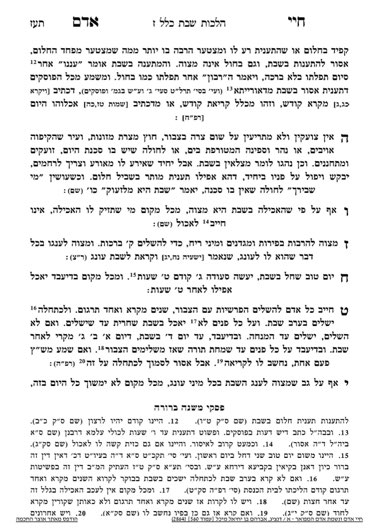The current series, which will cover seudos Shabbos and fasting on Shabbos, is available for sponsorship. Please contact Rabbi Reingold for more information.
We are beginning siman 10. The Chayei Adam writes that although there is a mitzvah of oneg Shabbos, one should not spend his entire day partying and having a good time. Rather, one begins with a respectable davening with Shacharis, laining and mussaf. Then, they should eat their seudah and enjoy it.
Sleeping is also an element of enjoyment; the word Shabbos can be understood as an acronym for sheina b’Shabbos taanug (sleep on Shabbos is pleasureful). The Chayei Adam recommends sleeping only a small amount. The Piskei Mishnah Berurah points out that the Arizal used to sleep for longer on Shabbos, but others counter that the Arizal is not an indication for anything because he was so great that angels would reveal themselves to him while he was sleeping.
The point to which the Chayei Adam is coming is that a person should make sure Shabbos is an opportunity for them to learn. Thus, even if a person wishes to sleep for longer, they should still be cognizant to leave themselves ample time to learn.
The Chayei Adam continues and writes that part of the point of Shabbos is that it gives a working person a break from the grind of the week, and allows them to focus on learning, so a person who works the whole week should try to learn as much as possible on Shabbos. Conversely, someone who learns seriously during the week can use Shabbos for relaxing, because they are learning every day.
The Chayei Adam continues the order to the day, and writes that at some point, a person davens mincha and eats shalosh seudos, but–especially in the summer–there can be an hour or two between shalosh seudos and maariv. A person should take advantage of this time to learn or say tehillim.
The Chayei Adam begins a new point. If a person needs to take care of something after Shabbos, it is muttar to nap on Shabbos for the purpose of having energy for the trip after Shabbos. The nap is muttar because of the concept of oneg Shabbos. However, one should not verbalize their intent. As long as it has not been verbalized, it is not obvious why they are sleeping, and since it can be perceived in two ways (oneg Shabbos or preparing), it is muttar. Hachana of non-melacha on Shabbos for after Shabbos is muttar if it is not obvious what his intent is
In this case, there is an added element in that over here, it is explicitly taking something which could have been understood as increasing oneg Shabbos and stating that its purpose was otherwise. Therefore, even though hachana (with no melacha) on Shabbos for a mitzvah purpose is normally muttar if one verbalizes their intent, here, it is inappropriate, because he taking away the sleep from the mitzvah of oneg Shabbos and designating his sleep for a different mitzvah purpose.
Thus, for example, when Shabbos is erev Shavuos, one can sleep on Shabbos to prepare for staying up all night on Motzai Shabbos/Shavuos, provided they do not state it explicitly. Even though if they were to explicitly state it was for Shavuos, there is no hachana because it is for a mitzvah, it is still inappropriate..
Summary
A person should find time to learn over Shabbos.
It is muttar to sleep on Shabbos in order to have strength for something after Shabbos, provided they do not state so explicitly.



